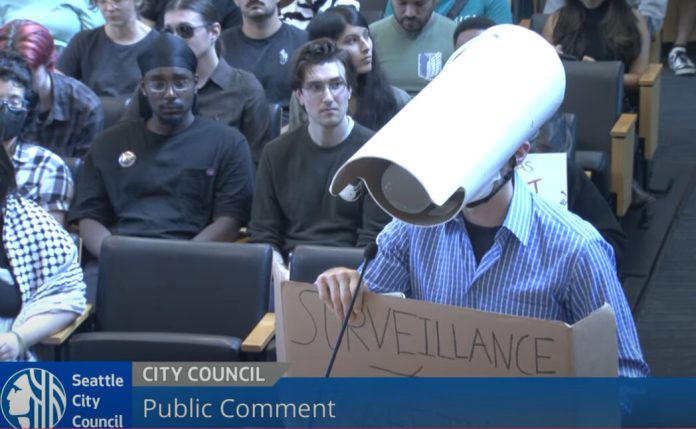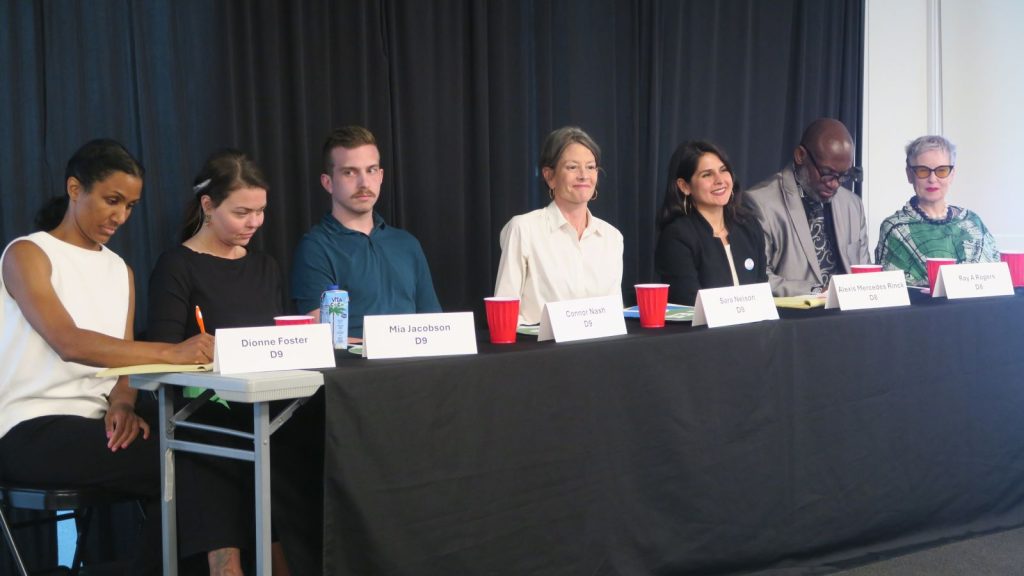
Progressive councilmembers and candidates spoke out against the surveillance expansion, citing risk of federal overreach and better uses for funds.
This week, the Seattle City Council took a controversial 7-2 vote to greatly expand the Seattle Police Department’s (SPD) surveillance pilot program, as proposed by Mayor Bruce Harrell. More than 100 community members came to speak against the expansion, citing fears of federal overreach and the potential for surveillance data to be used to detain and deport immigrants, persecute people seeking reproductive and gender-affirming health care, and punish those practicing their first amendment rights.
Councilmembers voted to add more surveillance zones and feed more cameras into SPD’s real time crime center less than four months after the initial pilot began in May. Since the planned evaluation of the program has not even begun, there is no analysis about either the surveillance pilot’s efficacy or any harms it may cause.
Councilmembers Alexis Mercedes Rinck (Citywide) and Dan Strauss (District 6) voted against the proposal.
The new expansion will add CCTV cameras to three new neighborhoods: the Stadium District, a portion of Capitol Hill west and south of Cal Anderson Park, and arterial streets in the area around Garfield High School. It will also allow SPD to incorporate hundreds of Seattle Department of Transportation (SDOT) traffic management cameras into their real time crime center.
SDOT told The Urbanist there are 365 of these traffic management cameras. The camera feeds are available to the public, but thus far haven’t been directly incorporated into SPD’s real-time crime center.
The new cameras will cost the city $1.025 million plus an ongoing annual maintenance cost.
The original surveillance pilot was passed last fall, in spite of the City’s official Community Surveillance Working Group (CSWG) being unsupportive of any pilot deployment of either CCTV cameras or the new real-time crime software. At the time, the Office of Civil Rights (OCR) released a report stating “there are several elements of the proposal that could worsen racial disparities.”
The OCR’s report also noted that the existing literature doesn’t show that CCTV and real time crime centers are effective for preventing gun violence and human trafficking, the stated purpose of the pilot.
At the council meeting this week, Councilmember Bob Kettle, who sponsored the bills, said, “I have a letter that says community members are overwhelmingly against expansion. That is not the case.”
The audience in chambers burst into laughter until Council President Sara Nelson reprimanded them.
“The district representatives […] we’re in district every day. We’re interacting every day with individuals and groups regarding this issue plus others,” Kettle explained.
Nonetheless, Kettle opposed an amendment that would have limited cameras to the arterials in the Capitol Hill nightlife district, in spite of the support of District 3 Councilmember Joy Hollingsworth, in whose district those cameras will be placed.
Kettle did sponsor an amendment with Rinck that would authorize a 60-day pause should any surveillance data be subpoenaed or otherwise obtained in a federal civil immigration enforcement matter. The amendment passed unanimously.
Councilmembers supporting the expansion addressed the lack of evidence that these technologies help prevent violent crime by pivoting to saying the increased surveillance is meant for investigative purposes, particularly for property crime. They said constituents who didn’t come to give public comment are asking them for help with crime and are supportive of more surveillance.
Using publicly available SPD data, Seattle’s homicide rates for the period of January to August of this year have dropped 43% compared to the same period last year. Violent crime rates for that period have dropped 23% and property crime rates have dropped 18.7%.
Due to timing, these drops in crime rates cannot be attributed to either the recent hiring of more SPD officers or the new surveillance pilot.
A wide range of opposition to the expansion
In a memo assessing the surveillance expansion proposal, the OCR spoke even more plainly than last year, advising against passing the new ordinances.
“Surveillance technologies can discourage civic engagement, weaken constitutional protections, and reinforce inequitable patterns of policing, monitoring, and enforcement. These harms disproportionately affect communities that are Black, Indigenous, People of Color, low-income, disabled, and 2SLGBTQ+,” the memo reads. “SOCR’s concerns are heightened by the national context, where local surveillance infrastructures that were originally justified in the name of safety, are leveraged by federal agencies in ways that undermine local autonomy, civil rights and liberties, and equity.”
Instead, the OCR recommended a multi-part strategy for promoting safety while protecting civil liberties and advancing racial equity that involves prioritizing community-based alternatives and social services, limiting data retention periods, increasing transparency around data usage, implementing clear pilots that are subject to evaluation, and ensuring more community engagement around any new surveillance adoption.
The Community Police Commission (CPC) also opposed the expansion. “Community members are overwhelmingly against expansion,” they wrote. “An immediate and consistent concern raised by community– and acknowledged, though not addressed, by the City Council – is the growing risk of actors outside the City misusing surveillance information against the Seattle community.”
The CPC continued by making a direct link between the city’s recent release from the consent decree and this decision.
“The expansion of surveillance that lacks data establishing its efficacy, in the face of community opposition, and when doing so exposes the Seattle community to federal overreach and further misuse of private information will only sow further mistrust of City government and SPD,” the CPC wrote. “The City just emerged from federal oversight of SPD, this is the time to listen to and prioritize community voice in public safety and policing.”
Mistrust of SPD might be stoked further by recent comments from the Seattle Police Officers Union (SPOG) President Mike Solan saying that he was glad his colleague was supporting the recent federal takeover of the Washington DC police department, and that this action is a “blueprint” of what he expects to see nationwide from President Donald Trump.
Solan received over 70% of SPOG’s membership vote for president in 2020. There is no publicly available information about any subsequent votes.
The ACLU of Washington, immigrant advocacy group OneAmerica, and Asian Counseling and Referral Service also condemned the surveillance expansion.
“We know that federal authorities are currently using these tools and the data they capture to surveil immigrants and those seeking gender affirming care. Seattle’s immigrant communities already face unprecedented attacks in this moment,” the organizations wrote. “Once surveillance data is collected, it is notoriously challenging to protect against federal misuse. Despite commitments from Washington state to guard this data, the Department of Homeland Security and ICE have successfully accessed data from the Washington Healthcare Authority and the Washington Department of Licensing. Seattle should not line up to be next.”
Seventeen Washington state legislators also sent the city council a letter opposing the expansion, writing that increasing surveillance in the largest city in the state at this time could undermine the legislative intent of the Keep Washington Working Act, passed in 2019 to restrict state and local law enforcement from cooperating with federal immigration enforcement.
“With the lessons learned from recent failures at our own level of government to secure similarly sensitive information, it is our ask that you pause the consideration of these bills,” the legislators wrote. ”Until both public and legal confidence in their use is established, we simply cannot risk the further victimization of our communities at the hands of a Federal administration that shows limited regard for constitutional protections.”
Rinck stated the council received a letter from 18 additional organizations opposing the expansion, as well as over 1,000 emails.
Candidates for office speak out
Harrell reaffirmed his support for the expanded pilot at a press event on Tuesday, acknowledging that there are real concerns but saying he doesn’t think “they” live in an area with disproportionate safety concerns.
“We think it’s good technology,” Harrell said.
Harrell also said surveillance would be a tool that would minimize racial bias, ignoring the OCR’s analysis as well as recent history.
In a case just this summer, a young Asian man was arrested for a suspected arson in Wallingford based on private camera footage. When the police searched the man’s home, they didn’t find the jacket seen in the video footage nor a credit card associated with the crime. There were also several key differences between his appearance and the man in the surveillance photos, but the comparison photos weren’t included in the probable cause statement. The man’s attorneys called it a “rushed and racist misidentification.”
Charges were dropped after the man spent nearly a month in jail.
Harrell’s opponent and frontrunner in the mayoral race, Katie Wilson, urged the council to reject the new surveillance proposals.
“Turning on more cameras won’t magically make our neighborhoods safer. But it will certainly make our neighbors more vulnerable,” Wilson said. “As the Trump administration escalates its attacks on immigrants, trans people, and big cities in general, we need to prioritize safety, not surveillance.”
Wilson referenced the state’s Medicaid data and Washington Department of Licensing data that has already been accessed by the Department of Homeland Security, including ICE. Wilson also referred to the recent federal takeover of Washington DC’s police department, whose real time crime center and all its data are now accessible to the federal government.
Meanwhile, the U.S. Department of Justice is now asking Washington state to hand over a copy of its complete voter database, which The Seattle Times reports includes “full names, addresses, birthdates, and driver’s license or partial Social Security numbers.”
Dionne Foster, who is running against Nelson for citywide council Position 9, spoke out against the expansion. “We need to protect our civil liberties and our communities at risk from federal overreach,” she posted to social media. “We should not make it easier for Trump to attack our neighbors. Seattle should pause expansion of the CCTV pilot until we can ensure that footage is protected under keep Washington working and other relevant laws.”

Foster told The Urbanist, “We need to be extremely careful with how we collect data, and where it is stored. We need local investments in safety solutions, but we also need to recognize the potential unintended consequences of these investments.”
Nelson voted in favor of expanding the pilot, saying the council voted to expand the Community Assisted Response & Engagement (CARE) department before they received its evaluation and therefore it isn’t unprecedented to expand a pilot early.
Foster received 58% of the vote in the August primary.
Both candidates for the vacant District 2 seat, Eddie Lin and Adonis Ducksworth, say they wouldn’t have voted for the surveillance expansion.
Lin, who led the primary race with 47% of the vote, also referenced the federal immigration agencies accessing Washington State’s healthcare and driver’s license information. In addition, he mentioned the recent Supreme Court ruling allowing “unconstitutional racial profiling in immigration-related stops.”
“Increasing surveillance at this time will only result in increased fear and anxiety for our communities, is a waste of scarce public resources, and will just discourage neighbors from accessing critical services in these surveillance areas, like schools, daycares, healthcare and jobs,” Lin told The Urbanist. “Instead of spending money on increased surveillance which could inadvertently fall into the hands of federal authorities (and cause heightened fear regardless), we should be strengthening our data privacy rules, look at turning off existing surveillance cameras, and funding programs like immigration defense and ’know your rights’ education to protect our communities.”
Ducksworth also said he would have voted no on increased surveillance.
“I’d rather see more investments in tiny homes, supportive housing, treatment, and diversion programs than more cameras. This is not the way to build trust in communities, especially at a time when the Trump administration and ICE are looking to lock people up, tear families apart, and bully local governments,” Ducksworth told The Urbanist. “Had I been on council, in an effort to be responsive to the issues in places like the CID and Little Saigon, I would’ve asked them to reconsider this expansion and come back with a truly meaningful proposal to address the root causes of crime, addiction, and homelessness.”
Rinck, who is leading her council race with 78% of the vote, gave an impassioned speech before the final council vote, in which she accused her colleagues of being reckless with people’s privacy instead of being data-driven. She gave a long list of examples of city and county surveillance data being shared improperly and sometimes illegally with the federal government in the last several months, saying it’s happening across the board.
“Why do we think we’re so special?” Rinck asked. “All across the US in other liberal and Blue cities where communities live, hoping that their government will serve and protect them, we’ve seen these data breaches and weaponization of data carry out this unjust deportation and criminalization regime, and now the Trump regime is threatening to send troops into Blue cities as of this morning.”
Rinck expressed concern about having cameras surveilling Cal Anderson Park, the site of many protests. Protest surveillance footage could be subpoenaed by the federal government, who could then run the footage through facial recognition algorithms that Seattle has promised not to use. This footage could be used to charge protesters with federal crimes, as is happening currently in Spokane.
“The community we all serve seems unequivocally opposed to these ordinances and expanding surveillance. So are we going to listen to the people that we serve?” Rinck asked her colleagues. “I do not look forward to the day where we have to step back up here on this dais and deal with the aftermath of our data being handed over to other actors. I do not want to be sitting up here in the future telling people I’m sorry we put your community in danger when we could have stopped it today. It is a matter of when, not if, our data will be handed over to the federal government and other actors.”
In a video recorded directly after the council meeting, Rinck shared that she recently moved into the Capitol Hill neighborhood that will now be having CCTV cameras installed. Depending on the positioning of the cameras, Seattle’s youngest and most progressive councilmember, who identifies as a queer woman of color, is likely to be surveilled by SPD the moment she leaves her home every day.
“I don’t know what comes next, but I know that this community is resilient and we’ll figure it out together,” Rinck said.
Amy Sundberg is the publisher of Notes from the Emerald City, a weekly newsletter on Seattle politics and policy with a particular focus on public safety, police accountability, and the criminal legal system. She also writes science fiction, fantasy, and horror novels. She is particularly fond of Seattle’s parks, where she can often be found walking her little dog.

